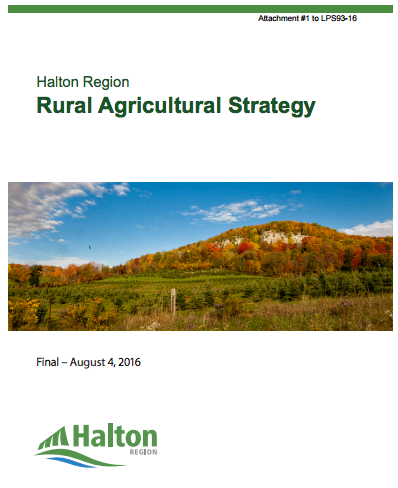 The Region of Halton is all aboard with a focused vision to strengthen and ensure the long-term viability of the region’s agricultural and rural sectors.
The Region of Halton is all aboard with a focused vision to strengthen and ensure the long-term viability of the region’s agricultural and rural sectors.
This month, Halton Region Council unanimously passed a Rural Agricultural Strategy (RAS) in an effort to build a prosperous and sustainable local agricultural system.
The agricultural sector in Halton has always been recognized as a significant driver of the region’s economy, but it’s facing some complex issues, and as a result, experiencing a decline in some areas. Reversing this decline and identifying ways to support farm viability has been at the centre of public discussion and regional strategy for quite a few years now.
A planning consultant, Margaret Walton, was hired by the Region to help create the strategy through research and engagement with the local ag community. Walton created a background report to inform the development of the strategy, which provided a comprehensive analysis of the agricultural and rural areas, while highlighting the challenges the region faces, which include: a decline in the number of farms, pressures from urban growth, an $8 million+ decline in gross farm receipts from 2006-2011, and a decrease in the livestock sector.
While these are certainly some significant issues to address, plenty of passionate and determined voices have come to the table to help strategize solutions together, including councillors, farmers, and the general public. The Region accepted public comment on the background report, and then developed the Strategy that has now been supported by Council. The Strategy acknowledges that farmers and rural residents have been and must continue to be part of decision making and be consulted on an ongoing basis during implementation.
The Halton Region website explains that the background analysis includes hamlets and rural clusters, identification of specific needs and challenges facing farmers and rural businesses, a review of legislation, regulation, policies and plans, an environmental scan of best practices and programs, and a SWOT analysis for agriculture and the rural settlement areas.
With a noted disconnect between rural and urban residents, rapid population growth and urbanization, the rising cost of farmland, and uncertainty about the future, the strategy comes at a pivotal time. The plan is to reduce barriers, and create opportunities.
Halton has always seen a strong commitment to supporting and promoting agriculture, but it’s now recognized that more action is necessary – there is a need for supportive planning policies that go beyond farmland protection.
“You have to create the circumstances for that land to be used profitably,” Walton said, quoted in this Inside Halton article. “But the Region can’t do everything. It’s constrained by provincial policy and provincial rules. During the next review of the Official Plan and provincial plans, hopefully there’ll be some innovative planning policy.”
Councillor John Taylor added a motion when the strategy was passed to have Halton write the Premier and Prime Minister to develop Ag strategies as well.
The background report, which you can view in full here, notes that the Halton Region is part of the Golden Horseshoe Food and Farming Alliance, and that the strategy will build on the Golden Horseshoe Food and Farming Action Plan, using our 5 pillars: Grow the Cluster, Link Food, Farming & Health, Foster Innovation, Enable the Cluster, and Cultivate New Approaches.
Of course, as the GHFFA recognizes, it is a collaborative approach. And the GHFFA looks forward to seeing what grows from the impressive RAS.
